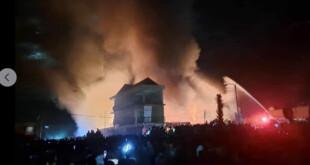
Bahar Ali Yousuf is a 27-year-old journalist from Ethiopia who had to flee the country last month to avoid being imprisoned by the government.
Yousuf gave an exclusive interview to Al Bawaba about his plight, which provides a glimpse into the Ethiopian government’s ongoing crackdown on the ethnic Oromo.
With a population of 27 million, the Oromo are the largest tribe in Ethiopia. They’ve suffered discrimination at the hands of the ruling Tigray tribe for decades.
The Ethiopian government, which is dominated by the minority Tigray, is a key ally of many Western countries in the “War on Terror.”
Yousuf is from an Oromo Muslim family in the eastern city Harar. He began working as a radio and TV journalist in 2013, covering Ethiopian politics and the Oromo protests that began in November 2015when the government attempted to appropriate Oromo farmland to expand Addis Ababa, the country’s capital.
The government responded to mostly-peaceful demonstrations by beating and arresting people andopening fire on the crowds. Since November, Ethiopian soldiers have killed 500 demonstrators, Human Rights Watch says.
The government has also cracked down on journalists who publish things that go against the party line.
Last year, Yousuf was imprisoned for three months for his coverage of the ongoing Oromo demonstrations.
“As a journalist, I did my professional job, which is reporting,” he told Al Bawaba. “But the government doesn’t like journalists. They want to hide what’s going on in our country. That is why they arrested me. Because I exposed that youth were being imprisoned and killed.”
Yousuf said he was tortured while he was in prison.
Though he was released after three months’ detention, Yousuf said the government tried to arrest him again, which led him to flee the country for neighboring Kenya.
Yousuf said goodbye to his family and took a series of buses with what little money he had to travel from Harar hundreds of miles south to the Kenyan border.
At the border, Yousuf was forced to spend the night in a hotel room while waiting for the crossing to open the next morning. He said the Ethiopian intelligence services were looking for him and others in area hotels, and he had to flee his room and sleep in the street to avoid getting caught.
The next day he crossed in to Kenya, and rode more buses to get from the border to Nairobi. He arrived in Nairobi on Aug. 16, and is now trying to win asylum from the United Nations High Commissioner for Refugees (UNHCR).

Yousuf was a reporter in Ethiopia who covered the government’s violent repression of the ethnic Oromo. (courtesy: Bahar Ali Yousuf)
Yousuf said part of the reason the Ethiopian government doesn’t like him is that his father was a supporter of the Oromo Liberation Front, a political party that the Ethiopian government declared a terrorist organization in 2011. Yousuf said his father was imprisoned and killed by government agents in the early 1990s, when Yousuf was only three-years-old.
In August, civil unrest in Ethiopia intensified, as a second ethnic group, the Amhara, joined the demonstrations. Over the course of three days in early August, Ethiopian soldiers killed an estimated 97 people during protests in half a dozen cities around the country.
“Hospitals have been filled by dead and wounded victims,” one witness told Reuters.
The US, which gives millions of dollars in aid to the Ethiopian government every year in exchange for military cooperation in the volatile Horn of Africa, has refused to condemn the government’s massacres, saying only that it was “deeply concerned” with the violence.
Other Western nations, who also use Ethiopia as a military and security partner, have been similarly tight-lipped.
It seems obvious that the inaction of Western powers is perceived by the Ethiopian government ascarte blanche to continue beating, arresting and slaughtering its own citizens.
“Still now the Ethiopian government are killing the Oromo people and taking their land and resources,” Yousuf said.
-By Hunter Stuart
Follow me on Twitter @hoont
Email me at hunter@corp.albawaba.com




